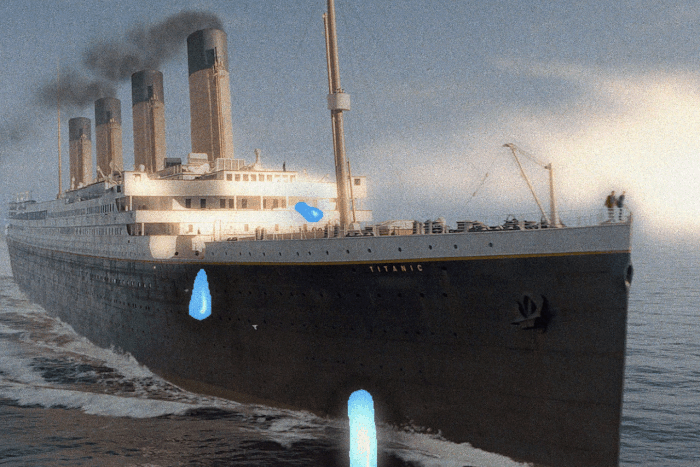
I’ve been crying to film scores for as long as I can remember. At least, as long as I’ve had access to money that I could take to Borders to rifle through the music section. I wasn’t a big crier outside of scores then, and I’m not a big crier now, but when I put my Lord of the Rings soundtrack into my personal CD player, I knew that I would shed a few tears — for the hobbits on their little journey, and for me on mine.
By my early 20s, I’d established my routine. I would listen to scores in full, not as white noise but to feel the emotional weight of a film without having to sit through it. Often I’d do this from my bed, covers pulled up to my chin, headphones on, letting the plaintive strings wash over me. Later, as life got busier and I had less time to jump into bed to listen to an hour of music, I’d do this propped up at my desk during a workday or on the odd cross-country flight home to offset my travel anxiety. These cathartic playthroughs conjure the feelings of familiar characters’ victories and tragedies with almost no physical effort. It’s like watching a movie on a speedrun, except I don’t even need to keep my eyes open.
Howard Shore’s LOTR soundtracks were always on a heavy rotation: “Concerning Hobbits” and “The Departure of Boromir” (duh) but especially the ten-minute-long track that accompanies the various endings in The Return of the King. The song shifts from the regal coronation of Aragorn as king of Gondor all the way to the hobbits finally returning to the Shire. For all the warmth of Return’s finale, this piece in isolation has a haunting quality to it — the hollow hum of woodwinds, the hesitant crescendos of violins asking if the characters we’ve grown to love are safe now. In the final minute of the piece, the jaunty “Concerning Hobbits” theme from The Fellowship of the Ring returns with a kind of nostalgic melancholy. They’ve been through so much! And so had I, in a fiftieth of the time.
Weirdly enough, the score for The Two Towers — the film in the LOTR trilogy most likely to make me cry while watching — inspires no tears. In fact, James Gray’s The Lost City of Z and Joe Wright’s Pride & Prejudice did not move me to tears when I watched them as films; it was only after seeing the movies, living with the weight of them, and then later listening to the soundtracks that I wept. Take Yves Thibaudet’s “Liz on Top of the World,” from the latter film, which plays over Elizabeth (Keira Knightley) as she stands atop a literal cliff and a figurative precipice of love. Or Christopher Spelman’s “The First Goodbye,” from The Lost City, in which Percy Fawcett (Charlie Hunnam) says good-bye to his wife (Sienna Miller) before his first trek into the Amazon. The first comment on the unofficial upload of the song on YouTube sums it all up with a succinct “:’(.” But it was only when I could focus on the doleful plucks of harp in Spelman’s music, or the swoon of strings in Thibaudet’s, that I could hear the sheer emotion I’d previously seen.
Sometimes there’s a discrepancy between the scoring of the film and the order in which the tracks are listed on a particular recording or streaming service. Take Paul Thomas Anderson’s Phantom Thread, in which the beloved piece “House of Woodcock” plays early, as designer Reynolds Woodcock’s (Daniel Day-Lewis) home opens for business, his tailors and sister (Lesley Manville) unlatching the shutters and getting ready for the day. The piano inches upward before cascading down, the whole piece a series of hills and valleys, like driving through the countryside. There is a clockwork rhythm to it, suggesting that this level of beauty is almost routine, if not expected. I’ve probably seen the film ten times, and my eyes welled up with tears during that sequence — the love and care put into welcoming morning into a home. The YouTube comments on a Nonesuch Records upload of the song are full of emotional confessions from the film’s fans: “This is the one and only song I’ve ever heard that makes me cry on its own. I’ve never been touched more by music in my life. Truly a one of a kind, and the most beautiful piece of music ever composed.”
“House of Woodcock,” however, is buried near the end of the Phantom Thread soundtrack, such that with each subsequent listen, I run the risk of forgetting it’s there, lured into the eerie comforts of Jonny Greenwood’s score. It pops up almost out of nowhere following the ethereal and jazzy “I’ll Follow Tomorrow,” shooting me back to the start of the film, feeling as though something magical is about to begin.
Over the past decade of score-crying, I’ve developed some short-time obsessions — with the scores of Christopher Nolan’s Interstellar, Jonathan Glazer’s Birth, Terrence Malick’s A Hidden Life, Lone Scherfig’s Their Finest. I’ve been known to dabble in TV scores, too, and was thrilled to buy the fourth season of Lost’s soundtrack on iTunes in particular. This way, I could relive the pleasure of episode five, “The Constant” (arguably the best episode of the entire series), without having to trudge through the pretty bad season that occurred around that episode’s surprising profundity.
But there’s one score that has remained a staple for me, a score I latched on to long before I ever saw the movie or learned who Billy Zane was: Titanic’s. James Horner’s oft-mocked, oft-imitated, hardly replicable two-disc score got me through college, through grad school, and through my whole 20s before I ever saw the film at the age of 30. I knew what I knew from cultural osmosis (the ship sinks, Leo’s in the water — got it) and that by listening to Horner’s score, I would be able to feel what everyone else already knew.
To this day, even if I make it through disc one without a tear, it always comes at the start of disc two with Horner’s “Titanic Suite,” an overture of sorts, stretching from the film’s optimistic early string melodies and rueful bagpipe before diving into the upbeat electronic choir (whose sound I can describe only as “O O OOO!”) and then an instrument-only arrangement of Céline Dion’s “My Heart Will Go On.” It’s not that the suite is tragic; rather, it’s when the suite is upbeat — that choir and all its staccato O’s! — that it takes me by emotional surprise, tricking me into thinking the Titanic may never sink.
That’s the beauty of the score cry. When I watch the film, the boat always goes down, and that is unquestionably sad. But when I listen to “Titanic Suite,” I can shut my eyelids and feel the whole cortège of feelings behind that sadness. What begins as naïve optimism turns into hopeful realism in 20 minutes or less. And it brings me to the same comforting, tear-jerking revelation every time: I might think of myself as bigger or better than James Cameron’s large boat movie, but none of us are, least of all me.
More From This Series
- The Bluey Method of Reducing Grown-ups to Tears
- Which Part of Beaches Makes the Author of Beaches Cry Hardest?
- 20 Streaming Movies That Will Make You Cry


